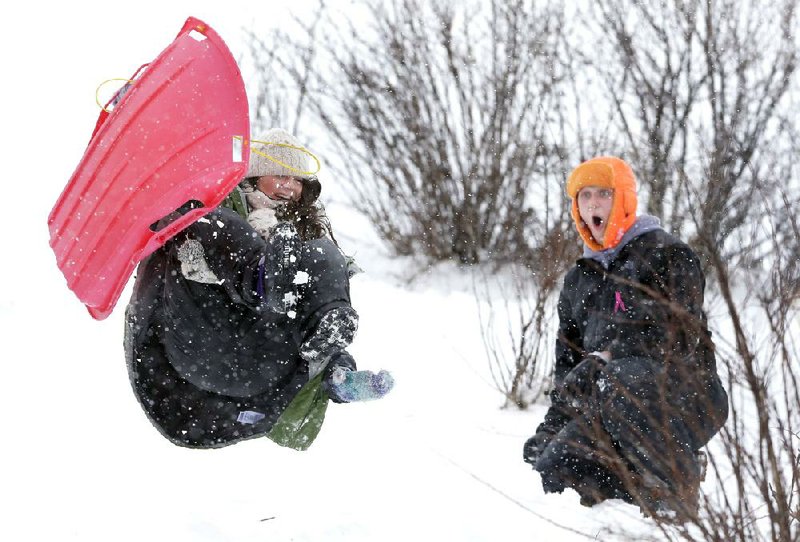DES MOINES, Iowa — The first widespread snowstorm of the season crawled across the Midwest on Thursday, with whiteout conditions stranding holiday travelers and sending drivers sliding over slick roads - including into a fatal 25-vehicle pileup in Iowa.
The storm, which dumped a foot of snow in parts of Iowa and Wisconsin, was part of a system that began in the Rockies earlier in the week before trekking into the Midwest. It was expected to move across the Great Lakes overnight before moving into Canada.
The storm led airlines to cancel about 1,000 flights ahead of Christmas Day - relatively few compared with past big storms, though the number was climbing late Thursday.
On the southern edge of the system, tornadoes destroyed at least one home in Arkansas and peeled the roofs from buildings, toppled trucks and blew down oak trees and limbs in Alabama.
In Iowa, drivers were blinded by blowing snow and didn’t see vehicles that had slowed or stopped on Interstate 35 about 60 miles north of Des Moines, state police said. A chain reaction of crashes involving big trucks and passenger cars closed down a section of the highway. Officials said two people were killed and seven injured.
“It’s time to listen to warnings and get off the road,” said Iowa State Patrol Col. David Garrison.
Along with Thursday’s fatal accident in Iowa, the storm was blamed for road deaths in Nebraska, Kansas and Wisconsin. In southeastern Utah, a woman who tried to walk for help after her car became stuck in snow died Tuesday night.
RELATED ARTICLE
http://www.arkansas…">State gets a whipping from wind
The heavy, wet snow made some unplowed streets in Des Moines nearly impossible to navigate in anything other than four-wheel-drive vehicles. Even streets that had been plowed were snow packed and slippery. Eight jackknifed big rigs were reported on a section of Interstate 80 east of the city.
The storm made travel difficult from Kansas to Wisconsin, forcing road closures, including part of Interstate 29 in northern Missouri and a 120-mile stretch of Interstate 35 from Ames, Iowa, through Albert Lea, Minn. Sections of Interstate 80 in Nebraska and Interstate 29 in Missouri that had been closed were reopened Thursday afternoon. Iowa and Wisconsin activated National Guard troops to help rescue stranded drivers.
Those who planned to fly before Christmas didn’t fare much better.
Shanna Tinsley, 17, and Nicole Latimer, 20, were both headed to the Kansas City area to see their families when their flight Thursday morning out of Milwaukee’s General Mitchell International Airport was canceled. Neither cared about a white Christmas and were hoping to get on another flight later in the day.
In Chicago, commuters began Thursday with heavy fog and driving rain, and forecasters said snow would hit by midafternoon.
Airlines delayed and canceled hundreds of flights out of Chicago’s O’Hare and Midway international airports. Southwest Airlines canceled all of its flights at its Midway hub that were scheduled for after 4:30 p.m., and American Airlines canceled its flights out of O’Hare after 8 p.m.
Airlines were waiving fees for customers affected by the storm who wanted to change their flights.
The cancellations were getting a lot of attention because the storm came just a few days before Christmas. But Daniel Baker, CEO of flight-tracking service FlightAware.com called it “a relatively minor event in the overall scheme of things.”
By comparison, airlines canceled more than 13,000 flights over a two-day period during a February 2011 snowstorm that hit the Midwest. And more than 20,000 flights were canceled during Hurricane Sandy.
Before the storm, several cities in the Midwest had broken records for the number of consecutive days without measurable snow.
As far as the region’s drought, meteorologists said the storm wouldn’t make much of a dent. It takes a foot or more of snow to equal an inch of water, said Brian Fuchs, a climatologist at the National Drought Mitigation Center.
Meanwhile, tens of thousands of people lost electricity in Arkansas, Iowa and Nebraska as heavy snow and strong winds pulled down power lines. Smaller power failures were reported in Alabama, Kansas, Missouri, Illinois and Louisiana.
“The roads have been so bad our crews have not been able to respond to them,” said Justin Foss, a spokesman for Alliant Energy, which had 13,000 customers without power in central Iowa. “We have giant four-wheel-drive trucks with chains on them, so when we can’t get there it’s pretty rough.” Information for this article was contributed by Scott Mayerowitz, Carrie Antlÿnger, Heather Hollingsworth, Jason Keyser, Barbara Rodriguez and Ryan J. Foley of The Associated Press.
Front Section, Pages 2 on 12/21/2012

